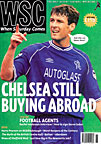 After looking painstakingly through all the surveys our readers sent in, Roger Titford explains the results
After looking painstakingly through all the surveys our readers sent in, Roger Titford explains the results
In an unusual turnabout, this year’s WSC survey gives Sepp Blatter a helping hand. Ever anticipating the key issues, we asked what damage you thought the number of foreign players was causing the game today. Of the first 900 questionnaires returned, 50 per cent said the England team was suffering, 45 per cent saw damage in the Premiership, 35 per cent in the Scottish Premier League and 30 per cent to the Scottish national side. Only 29 per cent felt the number of foreign players causing no damage anywhere in the game. Thirty-two per cent felt, like Sepp, the restrictions should be tightened, but 51 per cent thought they were about right.
This year we repeated some of the questions we asked in 1997. Given that our readership profile has changed very little, it’s a fair comparison and one which creates an impression of a game losing its hold on us. Those who find football less enjoyable than it used to be have risen from 22 per cent to 28 per cent, while those think it is more enjoyable have fallen from 14 per cent to 11 per cent. Perversely, perhaps, the under-24s think it is now more enjoyable.
The proportion fearing the survival of “the game as I know it” is up slightly, by four per cent to 61 per cent, and fears of domination by big clubs and the failure of the national team rise in similar fashion. More readers, about half of you, now view as enemies of fans like yourselves UEFA, the FA, big clubs and the stock market, though hostility towards the Premier League has not worsened since 1997. Sixty per cent of English lower division clubs’ supporters fear for their club’s survival. Forty-two per cent of those now sitting in all-seaters still hanker after the terraces, though 34 per cent say all-seater stadia are not as bad as they feared and 16 per cent feel they are much better.
Participation in fringe activities is also down: doing the pools, down eight per cent to 23 per cent; fantasy football, down eight per cent to 39 per cent; and buying replica shirts, down five per cent to 50 per cent. Forty-one per cent are against pay-per-view TV coverage in principle and only six per cent think £8 or more to watch a pay-per-view match is reasonable.
The other major theme to come through this year was the difference in the responses of supporters of Premiership teams, who made up 40 per cent of our replies, and those who supported teams in other divisions. Premiership fans looked forward to the season more, were more optimistic about the future of their club and were twice as likely to say that foot-ball was more enjoyable nowadays. They were significantly less likely to watch their team in the flesh or to be locals. Indeed, 12 per cent had no positive feelings for the town or city their team played in (compared to six per cent for Football League club fans), suggesting that, for one in eight, their team is a brand, not a family or territorial choice.
Yet fears of domination by big clubs also exist among 77 per cent of Premiership supporters and ten per cent fear for the survival of their own Premiership club. The structure of the game in England is increasingly seen as the big five or six clubs against the rest, and even some of the fans of the elite clubs in our readership appear to be concerned.
Two years ago we asked what you thought of 24 selected clubs. Asking the same question again produces a few significant differences (see table). We take away the “dislikes” from the “soft spots” which gives the overall balance of for or against. On this basis the most popular team of the 24 is still Wimbledon, the patron saint of underdogs. Their popularity has declined, but not as fast as Newcastle’s after Keegan left, or Fulham’s after Keegan joined.
Other big fallers were Chelsea, after they started winning things, and Blackburn, despite getting what many thought was a come-uppance. The big gainers, perhaps surprisingly, have been Manchester United and Arsenal. George Graham’s Tottenham are moving in the right direction, but Middlesbrough and the money they spend (and who they spend it on?) still attract the brickbats of the world.
Their local rivals Sunderland have a better grasp of the PR formula, while troubled Partick, Cowdenbeath and Hull all get more of a sympathy vote. There is very little change in the perception of the four continental teams. Readers have not become more likely to express an opinion about them over the past two years and, on average, Barcelona and Juventus attract only slightly more opinions (or less indifference) than lower division Football League teams.
Our thanks again to the Sir Norman Chester Centre and in particular Sean Perkins and Duncan Shipton for their help with processing the information, and to all readers who replied. The ten lucky T-shirt winners will be notified
From WSC 153 November 1999. What was happening this month